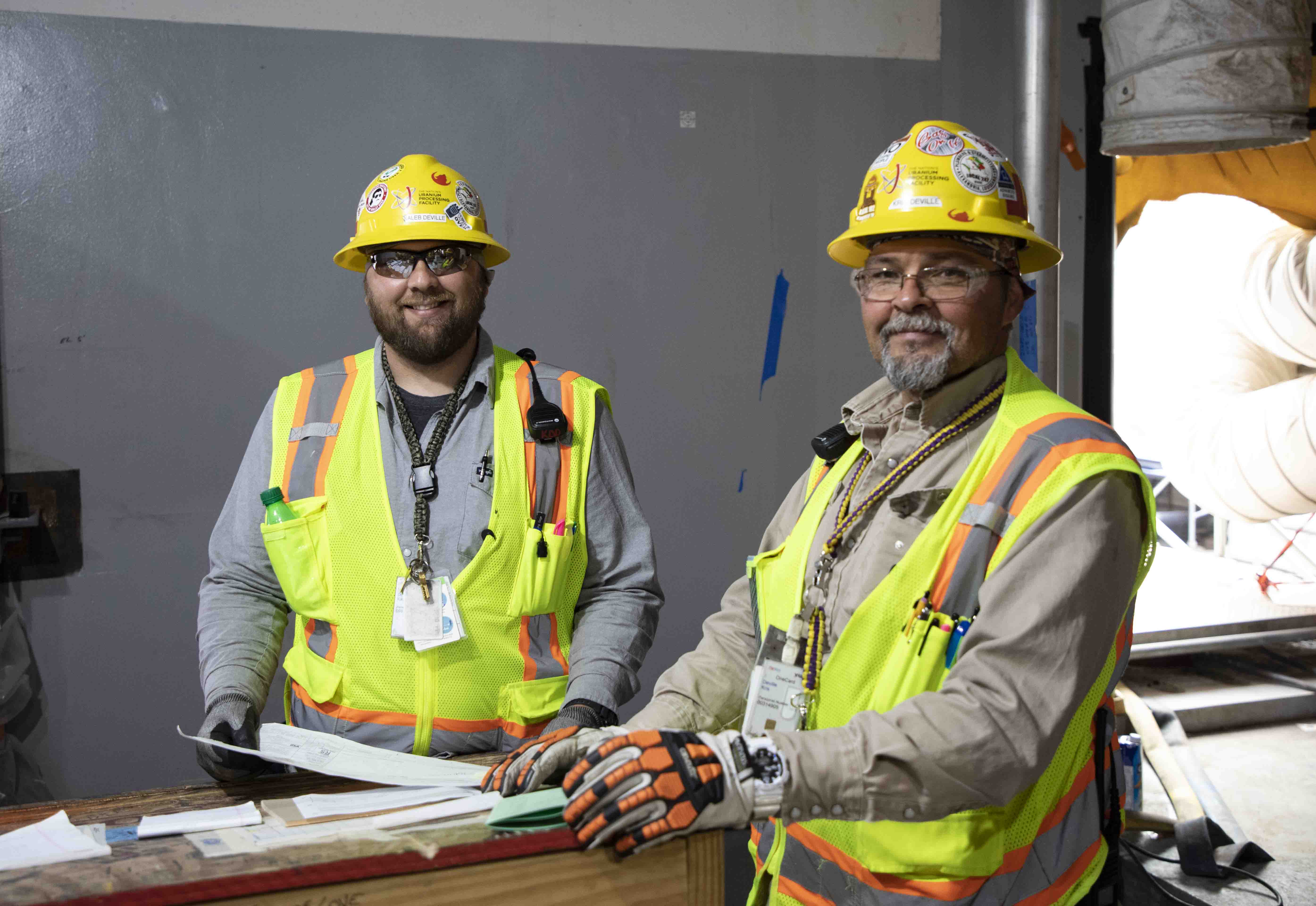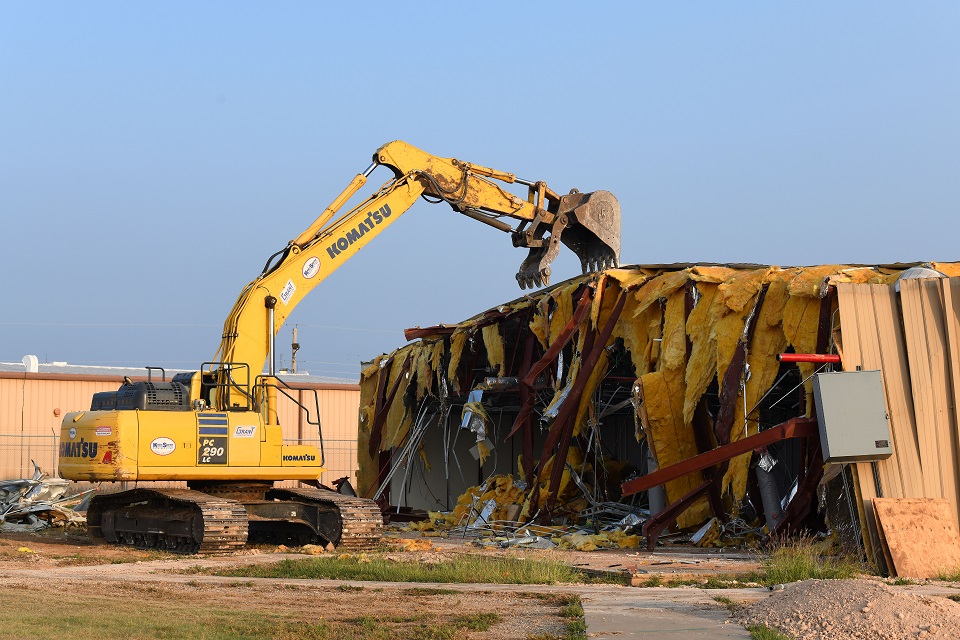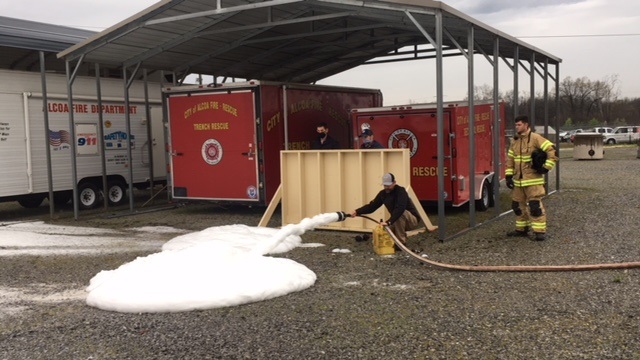Y-12 Blog

It’s not uncommon at the Y-12 National Security Complex to find that multiple generations from the same family have worked on site. At the Uranium Processing Facility (UPF) Project, two father-son duos don’t have to go far to celebrate Father’s Day, as they work side-by-side building UPF.
Pipefitting is a family trade for the Devilles, as Kris Deville and his son, Kaleb Deville, both lead pipefitter crews in UPF's Main Process Building. Kaleb followed in his father’s footsteps seven years ago, learning the pipefitter trade from him. Today, they manage installation, preservation, and restoration of the piping systems on the project. “I wouldn’t trade this experience for anything,” said Kris. “I knew someone was going to have to teach him leadership skills and I wanted that person to be me.”
Ernest “Bruce” Brown and his son, Ernest Bruce Brown, Jr. have been working together for three years now. Bruce Brown is a steward for ironworkers at UPF, while his son works as an ironworker at the project’s offsite fabrication facility. The elder Brown said, “Ernest and I have worked on several projects together and it has always been a special experience.” Ernest Brown, Jr. carries the family legacy and a legacy of contributing to Y-12’s national security mission.
As the world grappled with the economic impacts of the COVID-19 pandemic, CNS continued looking for ways to help our communities. The company turned to the East Tennessee Foundation and its Neighbor to Neighbor Fund. Leveraging dollars from the CNS Community Investment Fund, CNS was able to quickly get much needed resources to nonprofit organizations in East Tennessee through ETF.
Hamblen County Connectivity Project

Essential needs like food, shelter, and healthcare come to mind when talking about the resource challenges during any crisis. During the COVID-19 pandemic in 2020, Hamblen County added internet access to that list. The disruptions to in-person learning placed many school-aged children of low-income families in a precarious position. While the school system purchased 2,500 computers to assist these children, the computers weren’t much good without high-speed internet for online learning.
With a $5,000 grant from CNS, the Hamblen County Foundation for Excellence and Achievement, or HC EXCELL, through its Hamblen County Connectivity Project, identified 15 low-income families with school-aged children and provided them with high-speed internet access. Stan Harville, executive director of HC EXCELL, said they looked for families with more than one child in the home who also had older and/or high risk family members. On average, the families received $60 a month, allowing those children the option to attend school through virtual learning.
“We heard several stories about families being scared to send their children to school for fear they would bring the virus back into the home and threaten the lives of the older members or medically fragile members of the family,” Harville said.
Harville said access to high-speed internet allowed those families to keep their children at home and avoid being exposed to others. “By being able to shelter in place, these children were able to continue their learning and keep their families safe from the virus,” he said. “There is a gap in Hamblen County regarding online learning. Some families can’t afford the cost of internet. Grants like those from CNS kept that gap from widening in 2020,” Harville added.

Crews demolished Pantex Buildings 12-106 and 12-106A in FY 2020 as part of the disposition plan enabled by the opening of the John C. Drummond Center. EFDP characterized the facilities, removed waste, demolished the structures, and disposed of all demolition debris.
You’ve probably seen or heard about the ongoing demolition of Y-12’s old Biology Complex. It’s a major project that will clear space for construction of the Lithium Processing Facility. But massive, headline grabbing projects like this only tell part of the demolition story at Pantex and Y-12.
Across our sites, a team of employees and subcontractors — working with the National Nuclear Security Administration (NNSA) Production Office (NPO) and NNSA’s Office of Safety, Infrastructure, and Operations (NA 50) — has been quietly dispositioning legacy facilities for the past five years. In fact, since 2015, NNSA’s Disposition Program has removed more than 100 Pantex and Y-12 facilities.
“For several years, we’ve been strategically removing legacy equipment and materials, packing and shipping contaminated waste, and demolishing facility structures,” said Diane McDaniel, senior director, Excess Facilities Transformation, noting that disposition means far more than just demolition.
It’s high complexity, high consequence work. Most of the facilities were dangerously degraded and contained industrial hazards such as mercury, asbestos, and beryllium. And if that didn’t make things hard enough, the majority were located inside the sites’ protected areas, in close proximity to occupied facilities running essential mission operations.
Yet, from 2015 to 2020, the team dispositioned nearly 110 facilities — some 40 at Pantex and 70 at Y-12 — without a single safety or security incident, release of hazardous material to the environment, or impact to mission deliverables.
“I’m so proud of this team for the work they’ve done,” McDaniel said. “This program is such an important part of our sites’ commitment to legacy risk reduction and site modernization.”
With each completed disposition project, the team is reducing both the risks inherent in excess facilities and the costs associated with maintaining them. The Legacy Facilities and Services Team regularly dons personal protective equipment just to walk down these excess facilities, assess conditions, and mitigate any potential hazards

Crews demolish a Building 9201-05 (Alpha 5) dust collector tower at Y-12. Removal of this process contaminated facility eliminated the risk of facility degradation and/or fire and associated contamination release. This project furthered the preparation of Alpha 5 for demolition by EM.
Despite the challenges, the Projects Management team that executes facility dispositions has consistently met its milestones — even in 2020, with its period of reduced site operations and quarantines.
“The big thing last year was adapting. If one project couldn’t move forward due to COVID-19 impacts, weather, or site conditions, we were able to quickly substitute another,” said Kim Irwin, senior director of Projects Management. “Thanks to program managers, project managers, work planners, subcontractor partners, and our NNSA customers, we had the agility to adjust our plans to keep the teams together and maintain our momentum.”
All told, the program has reduced the excess facility footprint at Pantex and Y-12 by nearly 250,000 square feet to date, an amount comparable to the largest facility in the Biology Complex. But the program’s true impact may not be realized for years.
“Collectively, these 100 plus facility dispositions are addressing our sites’ 75 year legacies; reducing risk and improving safety today; and clearing the way for future projects and operations,” said Y-12 managing and operating contractor Consolidated Nuclear Security’s (CNS) Chief Operating Officer Bill Tindal. “This demonstrated partnership among NNSA, NPO, CNS, and the subcontracting community is key in transforming our sites into agile, responsive national assets for the next 75 years.”

CNS provided grants to area community agencies that helped meet the needs of many during 2020. The United Way of Anderson County provided financial assistance for mortgages, canned food, reduced-cost daycare, and transportation for seniors.
As the world grappled with the economic impacts of the COVID‑19 pandemic, CNS continued looking for ways to help our communities. The company turned to East Tennessee Foundation and its Neighbor to Neighbor Fund. Leveraging dollars from the CNS Community Investment Fund, CNS was able to quickly get much‑needed resources to nonprofit organizations in East Tennessee through ETF.
United Way of Anderson County
A $5,000 grant from CNS was combined with three other ETF funds resulting in a $9,000 Neighbor to Neighbor grant to support the United Way of Anderson County’s crisis response efforts in 2020. Executive Director of United Way of Anderson County Naomi Asher said the grant helped the agency “fill in the gaps” of needs across the community. Providing masks, subsidizing childcare services for medical professionals and first responders, offering food vouchers for at risk families, and dispatching vetted delivery services for seniors and high‑risk individuals were a few examples of assistance provided by the grant.
“This grant has impacted so many families,” said Asher. “We were able to help families by providing food and other essentials so that families could survive the difficult days of the pandemic.”
Asher described the plight of one of those families: the Garcias.
“Mr. Garcia passed away unexpectedly in February, and Mrs. Garcia had been working in a fast food restaurant for the last couple of years. When Mr. Garcia passed away and the pandemic hit, Mrs. Garcia was laid off. She and her family, which included three children, didn’t qualify for assistance and had nowhere to turn. Hungry, mourning, and about to lose their home, they found their way to United Way. We were able to ensure that the Garcia’s kept their home, provided food and other essentials, and helped Mrs. Garcia gain some additional skills and connections that helped her find a job. Today, while still grieving over her loss, she is no longer worried about not being able to provide for her family.”
Asher said the Garcias are just one example of the need created by the pandemic. Thanks to the Neighbor to Neighbor Fund and other generous donors, the United Way of Anderson County was able to help those in need.
“We are honored to help our neighbors in this time of crisis,” said Asher. “And thankful for companies like CNS. This is only possible because of them.”

Y-12 Fire Department recently tested a new environmentally safer foam with the Alcoa Fire Department.
The Y-12 Fire Department recognizes Earth Day as an opportunity to celebrate environmental successes and be creative in ways in which they are striving to improve.
Division Chief Ben Taylor said, “The fire service has an intimate relationship with the environment at large and water, which is typically used for fire suppression, so it makes sense for our team to look at ways we can adapt and continuously improve.”
One way firefighters look to improve is to find alternatives for often-used, expanding foams that help fight fires. Unfortunately, these foams typically contain pre and polyfluoroalkyl substances, or PFAS, which include various chemicals that have been increasingly studied due to their effects on the environment. Y-12 Fire Department recently partnered with several local fire departments to find an effective and environmentally safe product.
“Foam is essential for fighting a variety of fires — everything from brush fires to liquid petroleum fires,” Taylor said.
As a result of the collaboration, a new, fluorine free foam product was found that is effective, meets stringent Environmental Protection Agency testing, and allows for a seamless transition to the new product. The new foam will also be locally stored by supplies in large quantities.
“Having the new, environmentally safer foam will allow Y-12 Fire Department to continue to meet emergency response needs of Y-12 and bulk off site storage will maintain large scale response capability,” Taylor said.
“Earth Day is a reminder that we all share the environment,” Taylor said. “Actions we take now will have lasting impacts on generations to come. Recycling, reducing waste, and using innovative products, like this foam, will help to ensure that future generations will have a healthy environment to enjoy.”
